- Home
- Holly Black
Welcome to Bordertown Page 7
Welcome to Bordertown Read online
Page 7
Yidl is the human fiddle player, a sometimes-member of Widdershins, though he plays with klezmer and gypsy bands, too. He’s something of a legend here in Soho, and even a noob like me knows his name. “Jimmy, is it? Good to have you in the band,” he says cheerfully as he shakes my hand.
“Oh, no, I’m not joining—” I begin to protest, but he waves away my words.
“That’s what they all say. That’s what I said.” Then he nods in the direction of my new best friend. “They don’t call that boy Spider for nothing, you know. You’re in his web now—enjoy. A fix-it guy, huh? That’ll be useful.” He claps me on the back, laughing at my expression. “There’s no point fighting fate or Spider, my friend. It’s beshert—meant to be. Welcome to Widdershins.”
* * *
The Chimera was getting noisy. Still talking, Trish and Anush moved toward the door.
“Going so soon?” It was Billy Buttons again. “Our little party’s just beginning. Or it will be, as soon as Spider returns with the band. Stick around, why don’t you?”
“Maybe later,” Anush said. “We’re going out for some air.”
“Plenty of air in here. But suit yourselves, m’dearie-os.” With a flourish, Billy showed them the door.
Carmine Street was alive with kids out in the galleries, the funky little cafés, and the sidewalk market lit with colored lanterns. Trish and Anush drifted through Soho, talking, the stars bright overhead. They left the ancient Indian tales behind and moved on to their own histories. As they passed through the dark, silent streets around Whisthound Square, crossed through the crowds and fairy lights on Carnival, then up along the crumbling elegance of Mock Avenue, Trish told him about Mom and Dad and Jimmy. He told her about his parents, born into a struggling, emerging India torn by partition and war, their arranged marriage, their settling in America.
“All they care about is making safe choices for a safe life, and a job with security,” he said. “I know, I know, after what they went through, I can’t really blame them. But still.”
“I know.” She nodded. “My parents are all about security, too. Why can’t they understand that things are different for us now?”
“What do you want?” Anush asked.
“What do I want?” Trish hugged herself, as if she would fly apart without her two arms holding her together. All around her, the world was sharp and strange and full of promise. “There’s so much I want! I want to read every book in the world. I want to live a beautiful life and have friends who talk about books and music and poetry. I want to hear every story. I want to learn about everything there is—”
Anush leaned forward. Trish felt the warmth of his hands on her shoulders. “You’re going to college,” he said.
“I’m not going back to Milltown for community college, not after this.”
“Real college,” Anush said firmly. “Doesn’t have to be Harvard—maybe it’s Barnard, or Bryn Mawr, or Oberlin or Carleton or UMass or … or Berkeley. But you’re going.”
“I’m going? Just like that? But my parents don’t have the money—”
“There are plenty of scholarships, Trish—and there’s other kinds of financial aid. There’s a whole world out there waiting for you, I swear it.”
“But … but I just got here—”
“You don’t want Bordertown,” he said firmly. “You thought you did, but you said it yourself in the Hard Luck—this isn’t the kind of magic that you came for. You don’t want elves and runaways and cold-water squats and installation art. You want the other kind of escape: an ivory tower with a view of the library. Unlimited stacks privileges and a study carrel of your own.” His words sounded like an incantation. She didn’t even know what those things were. “There’s no reason you can’t have that. None.”
“But I didn’t get into Harvard,” Trish protested. “I’m not good enough—”
“Look, you were first in your class. Class valedictorian, honor roll … I bet your personal essay was just fine. And your new one will be even better—’cause for life experience, what beats some time in Bordertown? Schools will be fighting over you!”
“You really think so?”
“Definitely.”
“But what about a job? What about after college? That’s the first thing my parents are going to ask.”
“Grad school, more scholarships, grants—hell, if you like it, you could become a professor and just stay in the ivory tower, studying and writing and—”
“I can do that?” she gasped. “Make a living, get paid, just for learning and reading books?”
“Of course you can. It’ll take hard work—it’s a competitive field—but others have done it, so why not you? You made it here, didn’t you? Use the same courage and determination and you’ll do fine.”
It was the most perfect night of her life. Hardly night anymore—the sky was getting ashy, the stars were fading overhead. She wanted this night to never end.…
“Oh, shit,” Anush said suddenly. “Oh, no. Look, Tara, I really have to go. It’s late … I … I’m so sorry, Trish, I—”
“Oh, okay,” she said quietly. “Never mind.”
“No, look—I’ll find you. We’ll talk. I’ll see you later—”
Just like that.
Gone, as the dawn broke over the suddenly grungy-looking, desolate streets of Soho.
Had he really run away from her, run off down the street like she was infected or something?
But if he suddenly hated her, what did he mean about later?
And how did he know she’d been class valedictorian?
* * *
Anush scuttled back to his lady’s loft, transformed again. His Star Trek T-shirt hung low around his knees; he’d stripped off the whale pants as he raced through Soho, ducking in and out of alleys trying not to be seen. The mysterious latch opened to his pale, hairy fingers. He climbed the stairs, using his long arms to aid his short legs. It was funny how he could always find his way back here—as if he were a dog that knew its own yard.
Was part of him a beast in mind as well as body? How much of him was still himself now? He remembered pretending to be Gurgi for Trish—was it just yesterday morning?—coming up with all those stupid, funny things to say to her. Of course, he knew the books, so it was easy. A little too easy? Where did mind end and body begin?
Scratching his back with those tough, long fingers felt really good. Too good? He made himself stop. But he really wanted to—
Hold on, fella, he told himself. You’ll be okay. Just hold on until tonight; you’ll be yourself again as soon as night falls.…
“Ah, there you are.” It was his lady, cool and bright and beautiful as ever. He realized she’d never told him her name.
Nervously, he started scratching again.
“You missed an excellent party,” she said. “There was tilien, fresh from the Realm. But perhaps you would not have liked it, after all.”
Goddammit, why hadn’t she turned him into something cool? Instead of cursing him with beasthood, why couldn’t she have said, “To truly know what it is to be of the Blood, you must walk as one” and made him look like an elf? He would really love to know, just once, what it was like to be tall and blond. And besides, it would have been helpful for his research.
But no. He had to get picked up by a Trueblood tourist looking for a holiday fling in Soho. He just hoped he survived her summer vacation—and that she’d lift the curse before she left. Whenever that might be.
* * *
Yidl’s right—there is no point fighting fate or Spider, and I’ve given in to both. I’ve been helping out with the band this last week (just until I find Trish and head home, I tell them), and Rosco and I have moved into Spider’s squat, the Chimera.
The Chimera is a big ol’ house at the end of Carmine Street—past the vintage shops and cafés so new and hip that the paint on the wall hasn’t dried, past those weird little art and “happening” spaces (like Jama Pajama and House of Foof), past the dance studio and the
Pumpkin Coach and that bad elfin pizza place (whose bright idea was that?). You can’t miss the house, which is tall and narrow and painted Pepto-Bismol pink. Downstairs there are large, once-elegant rooms where a party is perpetually in progress, no matter what time of day or night you drop by.
This is Spider’s domain, the center of his web. He lives up in the attic with his instruments, his books, his spell-casting workshop, and a fat ginger cat called Godzilla. The middle two floors of the squat are inhabited by a fluctuating number of kids, most of them halfies (“Don’t say halflings,” Spider tells me. “It’s gauche”), and most of them artists or actors or fire-eaters or otherwise odd. Spider cooks for everybody (“Spell-casting and cooking are not unrelated,” he says) and anyone else who happens to drop in: stray musicians, stray painters and poets and potters, stray noobs who come and go, and occasionally total strangers who wander upstairs from the party, looking dazed and hungry.
No one really knows where Spider comes from; the past is a door he refuses to open. “I was born on the day that I set foot in Soho,” he says. “Let’s just leave it at that.” No one knows his birth name either (he says it’s High Elvish and unpronounceable); he’s been going by Spider ever since some sidewalk shaman told him that it was good luck. He is a spider, reaching out with those long, double-jointed fingers of his to pull everyone he meets into the web of his schemes and adventures. Not in a sinister way; there’s not an evil bone in that boy’s whole body. He pulls people into his world because it’s fun there, and Spider wants everyone to have a good time.
I’m just the latest to be pulled in. Everyone is friendly to Rosco and me, but I’m a fish out of water on Carmine Street, and Spider doesn’t seem to see that. “We’re all misfits here,” he says, almost proudly. “That’s why I started this squat, after all. For people like us, who don’t fit anywhere else. Halfies and homos and hopeless romantics, the outcast and outrageous and terminally weird. That’s where art comes from, Jimmy, my friend. From our weirdnesses and our differences, from our manic fixations, our obsessions, our passions. From all those wild and wacky things that make each of us unique.”
“But I’m not an artist,” I keep trying to tell him. “I fix things. That’s all. I’m an ordinary guy.”
“Balls!” he says. “But you go on pretending that’s true, if it makes you happy.”
I am attempting to earn my keep by working on special effects for Widdershins, hanging Spider’s ideas and spell-work on a steadying framework of mechanics. No, I’m no artist, but what I can do seems to be useful to people here: I am able to work in the in-between space where magic and machines are spliced together. Now, wizards are a dime a dozen in this town, and there are plenty of World-trained scientists, mechanics, and engineers, too, but folks who can work with the hybrid technologies of the Border seem to be less common. It’s supposed to be almost incomprehensible if your brain isn’t wired a particular way, but I’ve been tinkering with the stuff since I got here, and to be honest, it just isn’t that hard.
It all makes me remember the original Mr. Fix-it, whose repair shop I used to work in after school. Ernie, the old man’s name was, and I still use the tools that his wife gave me when he died. There aren’t any shops like his anymore; everything is so cheap now that folks just chuck stuff out and buy replacements from China. Ernie would have hated seeing that. I wish he could see what we’re doing here; I think, of all people, that old man would get it. There’s no rule book for how to blend magic with science; there’s no surefire recipe; there’s only instinct, intuition, trusting your fingers—all of which I first learned from him. My sister might understand it, too—not how this stuff works, but why it works. She’s the one who taught me about magic, after all, by leaving a roomful of books behind—all those myths and legends and fantasy novels—and maybe that’s why the language and logic of spell-work don’t rattle me now.
Here’s what I’ve built in the last few days alone: a circuit board powered by a three-part riddle song, a soundboard yoked to the lunar tides, and a spell-powered motor in which the poetry of the moving parts is as crucial as their function. I’ve discovered that the hybrid creations that work best can be beautiful, whimsical, diabolically clever, or even disarmingly simple—just so long as they’re not purely functional. Everything we make, or use, or fix has an animating spirit of its own, or it breaks.
Spider is an absolute genius when it comes to the art of weaving illusion and music together. I’m guessing that he learned both his music and his magery in the Realm (an unusual thing for a halfie, if true), but this is all part of the Spider Life Story that’s posted with “Keep Out” signs, so I don’t ask. He has crazy ideas that are like no one else’s, and when they work, the results can take your breath away. He’s not quite so good with the technical side—with the careful, methodical, logical grunt work that meshes his magery with human mechanics, but that’s fine by me; that’s the part I like: the puzzle to be untangled. So we work as a team, drinking endless cups of gritty elfin tea at the Pumpkin Coach while we sketch ideas, scribble calculations, dream, scheme, boast, and argue all night. Then we go back across the street, climb up to his workshop in the Chimera’s eaves, and pull out our tools, our diagrams, our maps, and put our ideas to the test. Most of them fail spectacularly, of course, but a few of them … well, we’re working on those. You have to build such things slowly, step by step, or it all crumbles like Faerie gold.
There are other people who want my help, too—everything from plumbing and wiring work to lighting at the Magic Lantern, and I like helping out, since everywhere I go is another place to look for my sister. People keep telling me they might have seen her—maybe yesterday or maybe last week—and then it always turns out to be some other girl with curly brown hair and a knapsack full of books. But I follow every lead, and one of these days the trail is going to lead me straight to Trish. It has to. It’s why I’m here.
And in the meantime, Mr. Fix-It is open for business.
* * *
“Did you hear?” a kid in the next booth was saying. “There’s a new monster in town.”
Trish was getting breakfast in the Hard Luck Café. She had a whole booth to herself, and she’d just spread out a copy of Nightlife to read with her eggs.
“Oh, that’s just the noobs being dumb,” another kid sneered. “Every time one sees Wolfboy out buying groceries, they go completely splaa.”
Trish was a little worried about Gurgi. She hadn’t seen him for nearly a week. But if he wanted to find her, he’d find her. Magical creatures were like that. Maybe if she went back to Riverside, he’d be there. She hated cleaning fish, but she needed the money. She still didn’t know if she should stay or go home, but she was going to need cash either way.
Cam came over with more toast for her, and Trish decided to ask her about the other thing on her mind: “Hey, Cam? Remember that Harvard guy, Anush?”
“I haven’t seen him since the Split. Maybe he went Worldward. A lot of people are leaving.”
“No, I saw him after the Split. He was at the Chimera the same night I was.”
Cam raised one eyebrow. “With or without the elf babe?”
Trish felt herself flush. She didn’t want to, and she certainly didn’t want Cam seeing it. So she pretended to blow her nose. “Without. We talked. He thinks I should go to college. But I don’t know.…”
“Well, while you’re thinking about it, I wonder if you could do me a favor? We’re putting on Mary Poppins Goes to Mars at the Changeling Theater next month, and I really need to put in more time there if the show’s going to work. Do you think you could pick up some shifts here for me? The pay is lousy, but the tips—”
Trish leaned across the table and hugged her.
* * *
Widdershins is playing The Ferret again tomorrow night. It’s going to be a terrific gig. Althea Windbreaker is the opening act (doing some kind of a capella thing with Nightingale and Wicker Leaf-and-Tree), and Widdershins has some new dance tunes that a
re sounding great in rehearsal. Spider wants to use some of our new special effects. I don’t think we’re ready yet—I’m not convinced we’ve worked out all the bugs—but Spider says the only way that we’re going to find out is to try.
Maybe I’m just a “nervous old nanny goat” like he says, but I want the effects to work perfectly. This will be the first time Widdershins uses stuff that I helped make, and I am nervous, but also excited, and I want it all to run like clockwork. So I’m up half the night tinkering with the very last bits, trying to leave nothing to chance. Okay, it’s only a few new effects in the whole show, and if they’re not perfect, no one will notice but me … but I’m proud of them. And Spider, of course, doesn’t fail to notice.
“So tell me again how you’re not an artist, you’re just the fix-it guy,” he says smugly. He laughs as he dodges the roll of gaffer tape I throw at his head.
I finally go to bed at four a.m. Calculations are still running through my head, but I think that Spider’s right: It’s all going to work fine. I fall asleep to the sounds of Rosco snoring and the music of the party below me. Then, this morning, I wake in panic. I’m shivering, in a total cold sweat, thinking, What the hell is going on? What on earth am I doing? I came to the Border for one reason only: to find my sister and to bring her back home. My mother and family are waiting for me. Real life is back there in Milltown, not here. I can’t just turn into somebody new. Mom is counting on me. Trish is counting on me. I didn’t come here to join a rock band.

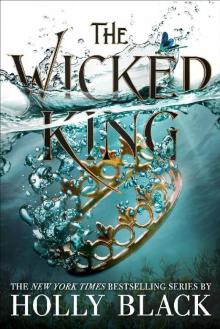 The Wicked King (The Folk of the Air #2)
The Wicked King (The Folk of the Air #2)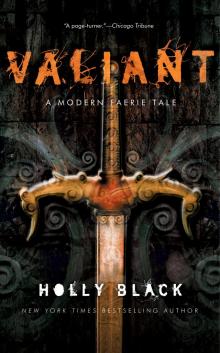 Valiant
Valiant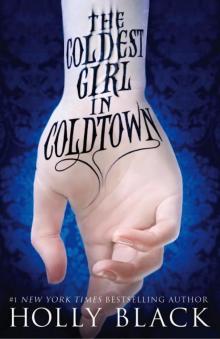 The Coldest Girl in Coldtown
The Coldest Girl in Coldtown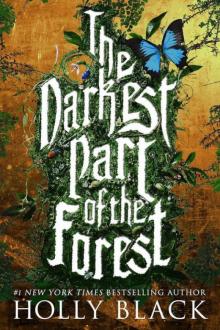 The Darkest Part of the Forest
The Darkest Part of the Forest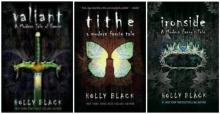 Tithe
Tithe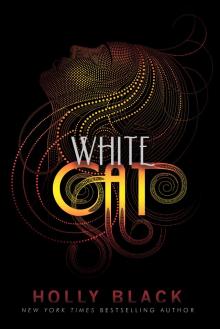 White Cat
White Cat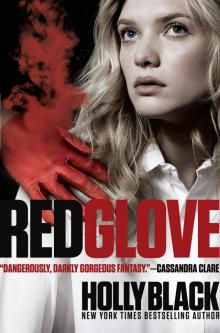 Red Glove
Red Glove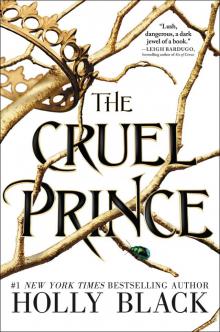 The Cruel Prince
The Cruel Prince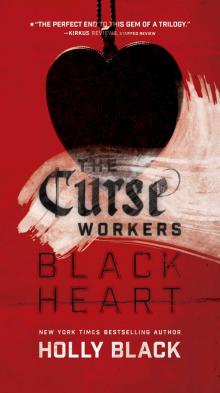 Black Heart
Black Heart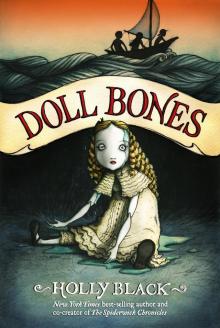 Doll Bones
Doll Bones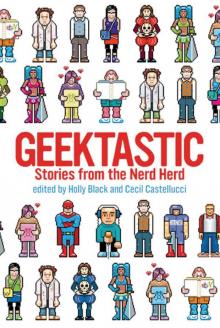 Geektastic: Stories from the Nerd Herd
Geektastic: Stories from the Nerd Herd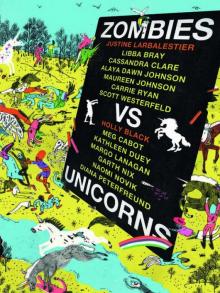 Zombies Vs. Unicorns
Zombies Vs. Unicorns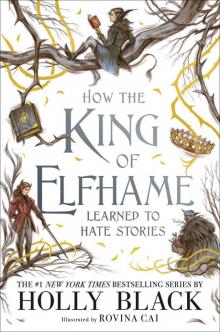 How the King of Elfhame Learned to Hate Stories
How the King of Elfhame Learned to Hate Stories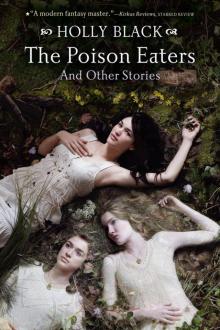 The Poison Eaters and Other Stories
The Poison Eaters and Other Stories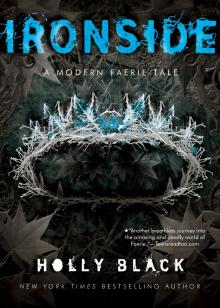 Ironside
Ironside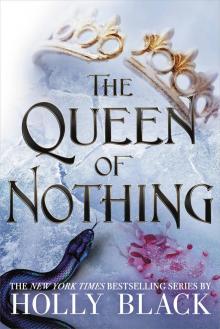 The Queen of Nothing
The Queen of Nothing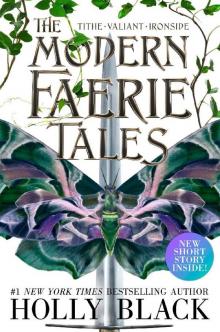 Modern Faerie Tales
Modern Faerie Tales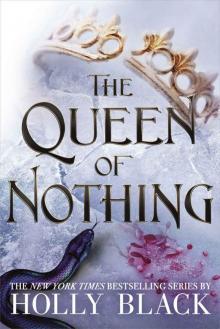 The Queen of Nothing (The Folk of the Air #3)
The Queen of Nothing (The Folk of the Air #3)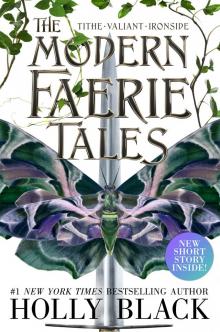 The Modern Faerie Tales
The Modern Faerie Tales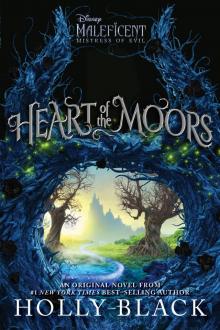 Heart of the Moors
Heart of the Moors The Golden Tower
The Golden Tower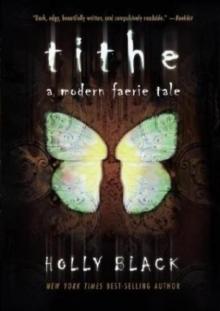 Tithe mtof-1
Tithe mtof-1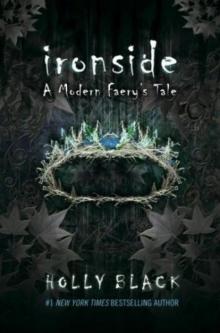 Ironside mtof-3
Ironside mtof-3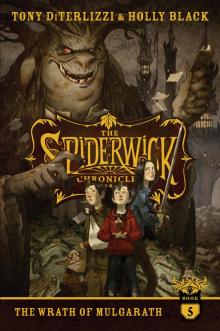 The Wrath of Mulgarath
The Wrath of Mulgarath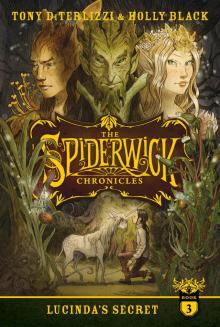 Lucinda's Secret
Lucinda's Secret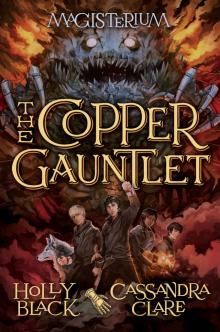 The Copper Gauntlet
The Copper Gauntlet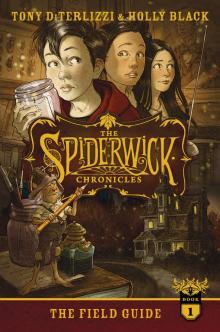 The Field Guide
The Field Guide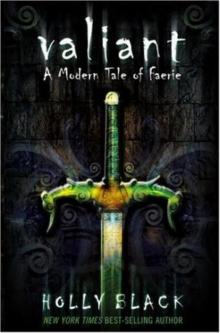 Valiant mtof-2
Valiant mtof-2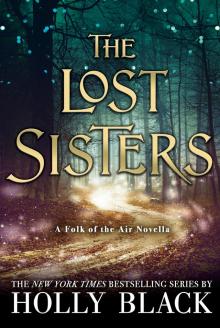 The Lost Sisters
The Lost Sisters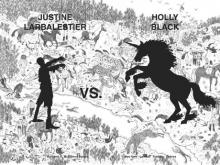 Zombies vs. Unicorns
Zombies vs. Unicorns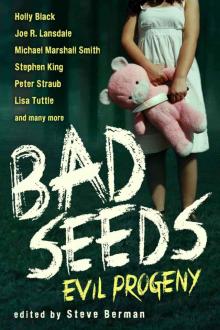 Bad Seeds: Evil Progeny
Bad Seeds: Evil Progeny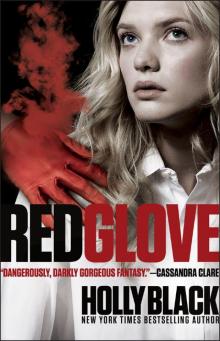 Red Glove (2)
Red Glove (2)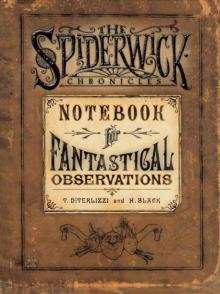 Notebook for Fantastical Observations
Notebook for Fantastical Observations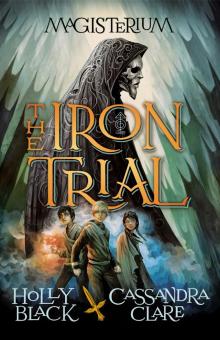 The Iron Trial
The Iron Trial Welcome to Bordertown
Welcome to Bordertown